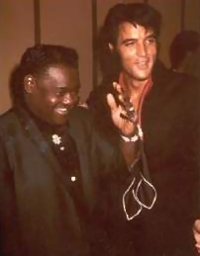Why yet another Fats Domino greatest hits release? Why do record labels keep putting out repackaged versions of the same original recordings? Fats Domino – 50 Greatest Hits appeared in 1999. Fats Domino Jukebox (20 songs) followed in 2002. Now here’s Fats Domino Greatest Hits: Walking To New Orleans, with 30 songs on one CD.
The obvious reason, of course, is that the owner of the recordings – in this case, Capitol Records – wants to keep making money from them. Many superfans and completists will buy a new release even if they’ve got all the tracks elsewhere, while others, who may just now be looking for a greatest-hits set for the first time, will be more attracted to a fresh package even if the material itself is half a century old. But there’s another reason, though it might not be one the label has in mind. Sales aside, a new collection of old songs can generate new artistic and cultural interest in a worthy artist. And when that artist is as essential, and as enjoyable, as Fats Domino, that can only be a good thing.
The new release has as good a selection as most fans could hope for, within the time limits of a single CD, and it’s a very good introduction to Fats for those who don’t know him. Since Domino had more than 30 hits, old-timers might wish one or another had been included that wasn’t, but all the biggies are here, from his breakout boogie “The Fat Man” to his colossal hit “Ain’t That a Shame,” from “Blue Monday” to “My Blue Heaven” to his definitive cover of “Blueberry Hill” (the version Richie Cunningham was always singing on Happy Days), and from “Bo Weevil” and “I’m Gonna Be A Wheel Someday” to “I’m Walkin'” and, of course, “Walking To New Orleans.”
Bill Dahl’s very good liner notes draw heavily from Rick Coleman’s groundbreaking biography Blue Monday, which vividly recounts Domino’s long and eventful life, right up through his dramatic rescue from his flooded home town during Hurricane Katrina. The book established the star’s importance to the history of race relations in mid-20th century America as well as to the development of modern rock and pop, and I need not go into that here. Truth is, Fats’s music, which dominated the charts during the 1950s, is just as enjoyable today. Its happy simplicity and its indomitable beat just won’t get old.
Ain’t that a shame: the new incarnation of WCBS-FM, the venerable New York oldies station, has redefined “oldies” as hits from the 60s, 70s and 80s rather than the 50s and 60s the way it used to be. Since I was born in the 60s, and came of age musically in the 70s, that station, and a similar one in Boston, were the places I learned Fats’s songs and got “Ain’t That a Shame” and “Blueberry Hill” sewn permanently into my own skin. (A painless procedure, I assure you.) People listening to the new CBS won’t get any Fats with their Rod Stewart and their Mamas and the Papas.
Fortunately, they can get this new CD. The price is great and the recordings sound as good as 50-year-old singles can be made to sound on a modern CD. (The very oldest tracks sound a bit worn, but I’m sure that’s because of the limitations of the source media.) On most tracks Domino’s vocals jump out like he just sang them yesterday. His iconic piano triplets chug up your spine, and Herbert Hardesty’s classic sax lines surge out warm and rich. Capitol’s Ron McMaster deserves kudos for a great mastering job. If you’re looking for a single, high quality, more-or-less definitive Fats Domino hits collection, for a very nice price, this is definitely your best bet.
Syndicated through Blogcritics to the Advance.net network and Boston.com.
